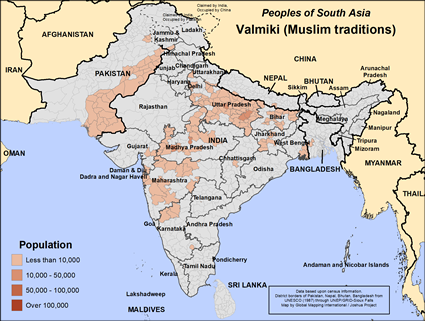Valmiki (Muslim traditions) in India

Send Joshua Project a photo
of this people group. |

Map Source:
People Group data: Omid. Map geography: UNESCO / GMI. Map Design: Joshua Project
|
| People Name: | Valmiki (Muslim traditions) |
| Country: | India |
| 10/40 Window: | Yes |
| Population: | 180,000 |
| World Population: | 269,400 |
| Primary Language: | Urdu |
| Primary Religion: | Islam |
| Christian Adherents: | 0.00 % |
| Evangelicals: | 0.00 % |
| Scripture: | Complete Bible |
| Ministry Resources: | Yes |
| Jesus Film: | Yes |
| Audio Recordings: | Yes |
| People Cluster: | South Asia Muslim - other |
| Affinity Bloc: | South Asian Peoples |
| Progress Level: |
|
Introduction / History
The Valmiki are also called Balmiki. They are a caste of street sweepers with low status.
What Are Their Lives Like?
Valmiki people face discrimination from a young age. At school their children are given derisive names. They are treated like they cannot learn by public school teachers. Those who work in parks clean things up, then take a stroll in the park only to be told to leave either by high caste members or by the police. If they resist, the police will beat them. Valmiki women are sexually abused by high caste men. There is nothing they can do about it.
Since the root of these problems is in the Hindu based caste system, some Valmiki have changed to a different religion. Most commonly they become Buddhist, but others have adopted Islam or Sikhism.
What Are Their Beliefs?
Among the Valmiki of India are Sunni Muslims who believe that the supreme God, Allah, spoke through his prophet, Mohammed, and taught mankind how to live a righteous life through the Koran and the Hadith. To live a righteous life, you must utter the Shahada (a statement of faith), pray five times a day facing Mecca, fast from sunup to sundown during the month of Ramadan, give alms to the poor, and make a pilgrimage to Mecca if you have the means. Muslims are prohibited from drinking alcohol, eating pork, gambling, stealing, slandering, and making idols. They gather for corporate prayer on Friday afternoons at a mosque, their place of worship.
The two main holidays for Sunni Muslims are Eid al Fitr, the breaking of the monthly fast and Eid al Adha, the celebration of Abraham's willingness to sacrifice his son to Allah.
Sunni religious practices are staid and simple. They believe Allah has pre-determined our fates; they minimize free will.
In most of the Muslim world, common people depend on the spirit world for their daily needs since they regard Allah as too distant. Allah may determine their eternal salvation, but the spirits determine how well they live on a daily basis. For that reason, some Muslims appease spirits using charms and amulets to help them with spiritual forces. More orthodox Muslims consider these practices heretical and un-Islamic.
What Are Their Needs?
The Valmiki people need to put their trust and identity in the hands of the loving God of Creation who sent his son to make it possible for them to enter the Kingdom of God.
Prayer Points
Pray for the Valmiki people to have the justice they need.
Pray for them to find their identity and sense of worth in the God who gave them life, and the savior who offers them life to the full.
Pray for a "Book of Acts" type of movement to Christ among the Valmiki people
Pray God will have mercy on the Valmiki, doing whatever it takes to place them in a position to receive him.
Ask God to open the hearts of the Valmiki to the gospel.